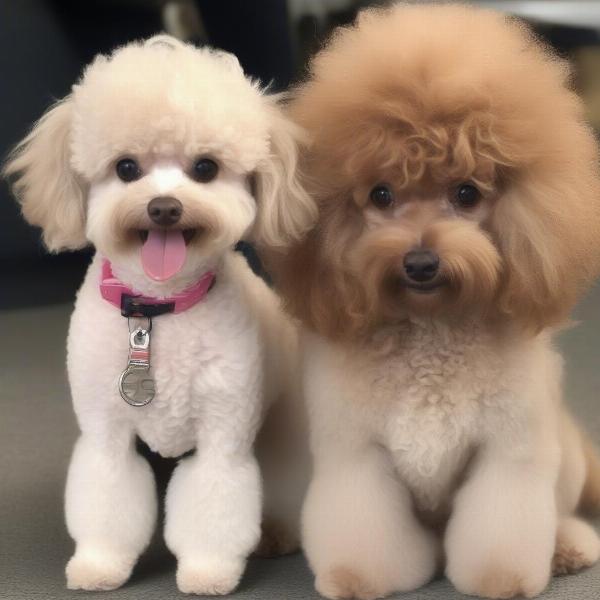The crossword clue “curly haired dog that fits in a purse” often leads to the same adorable answer: a Bichon Frise. However, several other small, curly-coated breeds could also fit the bill. This guide explores popular choices for a purse-sized, curly-haired companion, focusing on breed characteristics, care requirements, and what makes these fluffy friends so appealing. We’ll delve into the specifics of each breed, ensuring you’re well-equipped to choose the perfect curly-haired companion.
Many people dream of a tiny, fluffy dog they can carry everywhere. But choosing a dog based on size alone can lead to overlooking important aspects of their personality and care needs. While the Bichon Frise is the classic “curly haired dog that fits in a purse,” it’s crucial to consider other breeds with similar characteristics that might better suit your lifestyle. What about a curly-coated toy poodle or a charming Cavalier King Charles Spaniel with its wavy, luxurious fur? This article will explore these breeds and more, offering insights into their unique traits and needs to help you find your perfect match.
The Classic Choice: Bichon Frise
The Bichon Frise is often the first breed that comes to mind when picturing a small, white, fluffy dog. Their cheerful disposition and playful nature make them delightful companions. These small dogs are truly portable, easily fitting into a carrier or even a large purse. Their hypoallergenic coat is a major draw for allergy sufferers, requiring regular grooming to maintain its fluffy texture and prevent matting.
Other Curly-Coated Cuties: Exploring Alternatives
Beyond the Bichon Frise, several other small breeds boast charming curls. Consider the Toy or Miniature Poodle, known for their intelligence and hypoallergenic coats. Their curls can be styled in various ways, from tight and springy to flowing and elegant. Another option is the Bolognese, a lesser-known breed with a dense, fluffy white coat that requires dedicated grooming.
 Toy Poodle and Bolognese Comparison
Toy Poodle and Bolognese Comparison
Caring for Your Curly-Haired Companion
Regardless of the specific breed, curly-haired dogs require consistent grooming. Regular brushing, bathing, and occasional professional trims are essential to prevent mats and tangles. Beyond grooming, these small dogs thrive on companionship and benefit from consistent training and socialization. Remember, a small dog still needs plenty of exercise and mental stimulation to stay happy and healthy.
Finding the Right Fit: Matching Lifestyle and Breed
Choosing the right breed is a crucial step in responsible pet ownership. Consider your lifestyle, living situation, and activity level. Are you prepared for the grooming commitment of a curly-coated dog? Do you have the time and energy to provide adequate exercise and socialization? Researching breeds thoroughly and meeting potential pets before bringing them home will help ensure a successful and fulfilling relationship.
Conclusion
While the “curly haired dog that fits in a purse crossword clue” often points to the Bichon Frise, several other equally charming curly-coated breeds could be the perfect fit for you. By considering individual breed characteristics, grooming requirements, and your lifestyle, you can find a loving and adorable companion to share your life with. Remember to research thoroughly and prioritize responsible pet ownership for a happy and healthy relationship with your new furry friend.
FAQ
- Are all curly-haired dogs hypoallergenic? Not all curly-haired dogs are truly hypoallergenic, but some breeds, like the Bichon Frise and Poodle, produce less dander, making them a better choice for allergy sufferers.
- How often should I groom my curly-haired dog? Curly-haired dogs typically require brushing several times a week and professional grooming every 4-6 weeks.
- Are small dogs easier to care for than larger dogs? While small dogs may require less space, they still need adequate exercise, training, and socialization.
- What is the lifespan of a small, curly-haired dog? Small dog breeds generally have a longer lifespan than larger breeds, often living 12-16 years or more.
- Where can I find reputable breeders of small, curly-haired dogs? Research breed-specific rescue organizations and reputable breeders carefully, asking about health testing and socialization practices.
- What are the common health issues in small, curly-haired breeds? Common health issues vary by breed but can include dental problems, allergies, and certain genetic conditions.
- How much exercise does a small, curly-haired dog need? Even small dogs need daily exercise, including walks, playtime, and mental stimulation.
About ILM Dog
ILM Dog (https://ilmdog.com) is your trusted international resource for all things dog-related. We offer expert advice on Dog Breeds and Selection, Health and Medical Care, Training and Behavior, Nutrition and Feeding, Grooming and Hygiene, and Products and Accessories. Our global community provides reliable, practical information for both novice and experienced dog owners. Contact us at [email protected] or +44 20-3965-8624 for expert guidance.